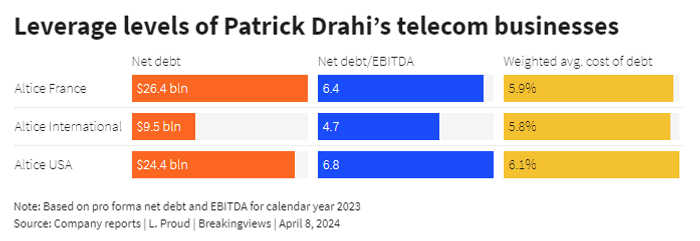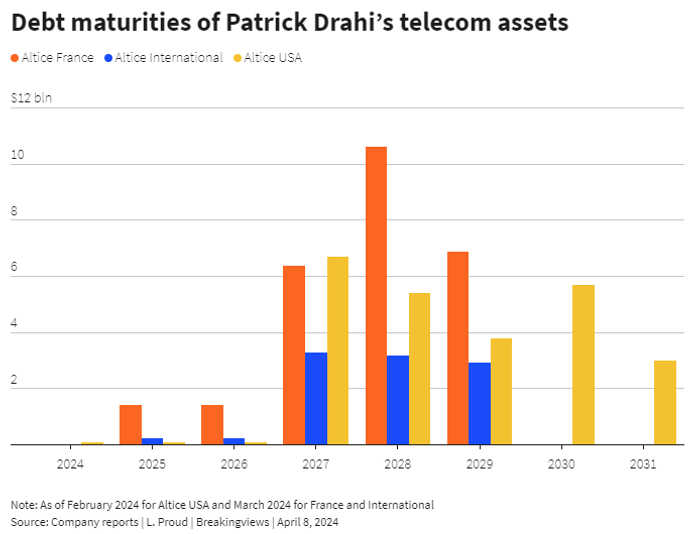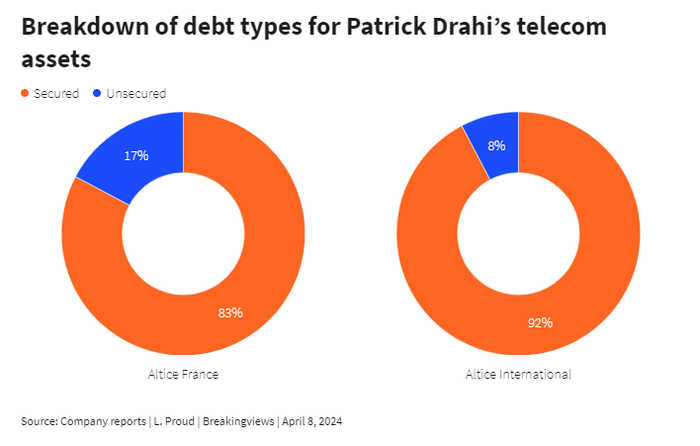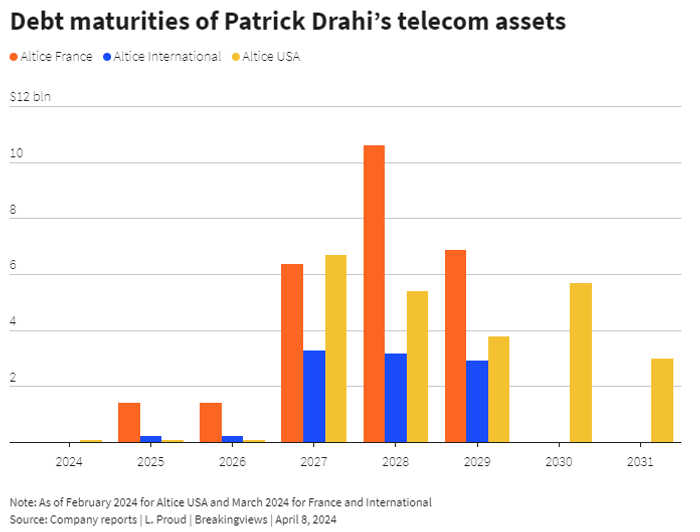Published 16:28 IST, April 14th 2024
How Patrick Drahi can clamber out of his debt hole
Drahi’s assets span broadband, mobile and media businesses in France, the United States, Portugal and Israel, as well as auction house Sotheby’s and Britain.
- Republic Business
- 6 min read

Basket case. People who know Patrick Drahi characterise him as a ruthless and meticulous strategist. Yet creditors fighting the telecom tycoon in France seem to think the Moroccan-born entrepreneur is unprepared for battle. Which side is right could ultimately determine who controls a key part of the transatlantic Altice empire, currently straining under $60 billion of debt. The odds favour Drahi.
The 60-year-old, who moved to France as a teenager, is Europe’s answer to John Malone, the so-called “cable cowboy” known for his success in rolling up U.S. pay-TV businesses with financial structures of mind-boggling complexity. Drahi’s assets span broadband, mobile and media businesses in France, the United States, Portugal and Israel, as well as auction house Sotheby’s and a quarter of Britain’s $14 billion BT.

The problem is that Drahi largely built his empire with aggressive borrowing. Privately held Altice France’s net borrowings at the end of 2023 were 6.4 times the EBITDA it generated that year. At Altice International, which includes operations in Portugal and Israel, the multiple is 4.7 times. Most large European telcos operate with much less leverage.
Meanwhile, valuations are in the doldrums. The European telecom sector trades at a little over 5 times last year’s EBITDA, according to LSEG data, implying that Drahi’s two continental businesses have little or no equity value. The market capitalisation of Altice USA, a listed cable operator in which he controls a roughly one-half economic stake, has shrivelled to around $1 billion, from $20 billion in late 2020.
Interest payments already swallow up the lion’s share of the operating cash flow that Drahi’s European businesses generate. And that’s with a relatively benign weighted average interest rate of 6%. Altice France and Altice International have chunky debts coming due in 2027, which they will have to refinance at much higher rates – assuming they can borrow at all.

The problems are most acute in the French business, where Drahi last month unveiled his gambit to turn things around. Longtime lieutenant Dennis Okhuijsen, once a treasurer at John Malone’s Liberty Global, told bondholders they may have to accept haircuts to get leverage down to 4 times EBITDA. That implies slashing more than $10 billion from the unit’s $26 billion net debt pile. Creditors were stunned: Drahi had previously laid out a plan to cut borrowings by selling assets including a media business, a data centre operator, and a fibre broadband unit. Now, he is proposing that debtholders take all the pain instead.
Hard cell
The creditors have mobilised for a fight, forming two broad groups. One camp is mostly composed of holders of the secured debt, which has an overall face value of almost $22 billion. The other group includes more unsecured creditors, who in total are owed $4.5 billion. Both are confident of bringing Drahi to heel. Their core argument is that his shuffling of assets creates personal criminal liability under French law if Altice France becomes insolvent. In that scenario a judge could decide that Drahi had committed “l’abus de biens sociaux”, effectively the misuse of company assets.
Creditors reckon Drahi will want to avoid a court-run restructuring process that would probably kick off if Altice France and its lenders fail to agree. Given the company’s extreme leverage, he would probably lose his equity stake in the business. Bondholders feel that Drahi is underprepared and has opened Pandora’s box, one investor told Breakingviews.

Yet Drahi holds several important cards. Unsecured creditors also have good reasons to avoid a court-run restructuring process as they would also risk losing everything. That’s because the company’s secured debt alone is 5.3 times its 2023 EBITDA, exceeding a fair valuation multiple for the slow-growing company.
The tycoon has negotiating leverage over the secured creditors, too. He is effectively threatening to siphon off the proceeds of Altice France’s asset sales, which could amount to $6 billion or more, by taking advantage of a provision in the company’s debt documents known as a “builder basket”. This allows a borrower to move money – or entire businesses – out of the reach of creditors. The basket’s maximum size grows over time, and CreditSights analysts reckon Drahi’s receptacle at Altice France may have reached $20 billion. Drahi has this leeway thanks to loose covenants in Altice’s bond documents, which according to one credit investor surpass a thousand pages – twice as long as peers.
The risk for secured creditors is that Drahi continues to move assets beyond senior bondholders’ grasp, reducing the value of their security. If they’re wrong about his personal liability under French law, it might be too late to do anything else.
Ample bandwidth
These considerations make a compromise the most rational outcome for all. Bond prices point to the possible discounts borrowers may have to accept. Altice France’s various secured credits currently trade at between 70% and 90% of face value, while unsecured notes trade at roughly 30% to 40% of par. All in all, the market price of Altice France’s bonds is about $6.4 billion less than their face value, according to Breakingviews calculations based on LSEG data.

Drahi could take advantage of that gap by buying back Altice France’s unsecured debt at a discount and swapping the secured notes into bonds with a lower face value. That would get him more than halfway to his new leverage target. The tycoon could then release any remaining asset-sale proceeds from the builder basket, further reducing debt. In the process, he would restore some value to his troubled empire. With net debt reduced to 4 times EBITDA, and assuming a valuation of 5 times, Altice France’s equity would be worth more than $4 billion.
Even if he could pull off such a manoeuvre, Drahi would still have other problems. Indeed, shaking down creditors at Altice France could spook lenders to Altice International and Altice USA, making it harder to refinance those borrowings when they come due. He has no better options, though. Besides, the premise underpinning Drahi’s entire credit-fuelled shopping spree was that debt markets would be there when he needed them. He’s been right so far, and it’s too early to say for sure that investors have developed longer memories.
Context News
Altice France executive Dennis Okhuijsen on March 20 said the telecommunications group expected its lenders to help reduce the company’s leverage by accepting haircuts on outstanding debt worth 24 billion euros. Options include swapping existing bonds or loans for new instruments that have a lower face value, or Altice buying back debt at a discounted valuation, he said. The company, controlled by founder Patrick Drahi, wants to reduce its net debt to less than 4 times EBITDA, from 6.4 times at the end of 2023.
Updated 16:28 IST, April 14th 2024